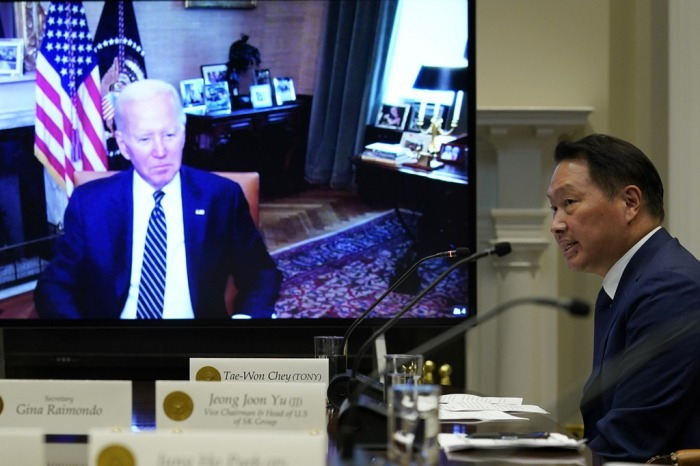Corporate strategy
SK’s Chey says survival is now top priority over profits
SK Group braces for a possible military conflict between the US and China in the worst-case scenario
By Sep 22, 2022 (Gmt+09:00)
1
Min read
Most Read
LG Chem to sell water filter business to Glenwood PE for $692 million


KT&G eyes overseas M&A after rejecting activist fund's offer


Mirae Asset to be named Korea Post’s core real estate fund operator


StockX in merger talks with Naver’s online reseller Kream


Meritz backs half of ex-manager’s $210 mn hedge fund



SK Group Chairman Chey Tae-won says that survival now takes top priority over profits and management efficiency as escalating tensions between the US and China could lead to a military conflict between the two countries under the worst-case scenario.
“Now the top priority is finding ways to survive under any scenario,” the chairman of South Korea’s second-largest business group told Korean correspondents in Washington D.C. on Thursday.
“We are opting to be on the safe side rather than maximizing profits and management efficiency as we did in the past. We are preparing for various scenarios, which encompass a possible military conflict between the US and China over Taiwan.”
Regarding the US' ban of exports of high-tech chips and devices to China, Chey said the move could lead to diverting new investments by SK Hynix Inc., the world’s second-largest memory chipmaker, into other production bases.
“If such devices are not allowed into China, our plant there will become old and difficult to upgrade,” Chey said in a news conference. “If so, we cannot help but find other places to invest, or build plants somewhere else.”
Hynix operates a semiconductor plant in Wuxi, China.
Asked if the US-China conflict could result in a reduction in SK's investments in China, he said: “I am preparing for a wide range of scenarios, from the most extreme to maintaining the status quo,” he said.
When it comes to the US Inflation Reduction Act, Chey said the new law reflects the decoupling trend, which could either pose a higher risk to Korean companies or benefit them.
Write to In-Seol Jeong at surisuri@hankyung.com
Yeonhee Kim edited this article.
More to Read
-
 Business & PoliticsTrump Jr. meets Korean business chiefs in back-to-back sessions
Business & PoliticsTrump Jr. meets Korean business chiefs in back-to-back sessionsApr 30, 2025 (Gmt+09:00)
-
 Korean chipmakersSamsung in talks to supply customized HBM4 to Nvidia, Broadcom, Google
Korean chipmakersSamsung in talks to supply customized HBM4 to Nvidia, Broadcom, GoogleApr 30, 2025 (Gmt+09:00)
-
 EnergyLS Cable breaks ground on $681 mn underwater cable plant in Chesapeake
EnergyLS Cable breaks ground on $681 mn underwater cable plant in ChesapeakeApr 29, 2025 (Gmt+09:00)
-
 Business & PoliticsUS tariffs add risk premium to dollar assets: Maurice Obstfeld
Business & PoliticsUS tariffs add risk premium to dollar assets: Maurice ObstfeldApr 29, 2025 (Gmt+09:00)
-

Comment 0
LOG IN


